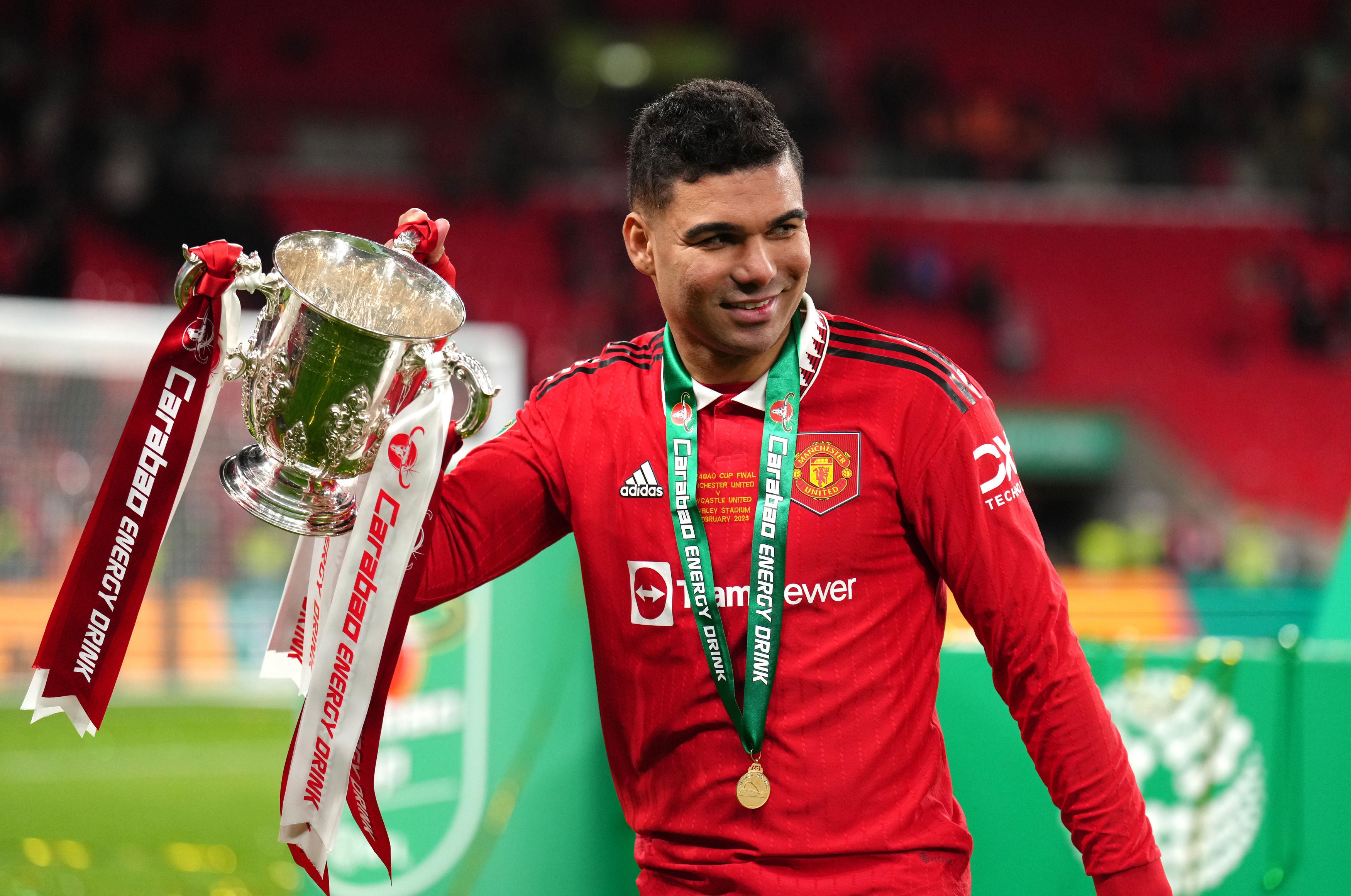Casemiro is Manchester United’s game-changing catalyst reminiscent of Cantona
The Brazilian midfielder provided the charisma as well as the quality to restore Manchester United’s winning feeling with victory in the Carabao Cup final

Your support helps us to tell the story
From reproductive rights to climate change to Big Tech, The Independent is on the ground when the story is developing. Whether it's investigating the financials of Elon Musk's pro-Trump PAC or producing our latest documentary, 'The A Word', which shines a light on the American women fighting for reproductive rights, we know how important it is to parse out the facts from the messaging.
At such a critical moment in US history, we need reporters on the ground. Your donation allows us to keep sending journalists to speak to both sides of the story.
The Independent is trusted by Americans across the entire political spectrum. And unlike many other quality news outlets, we choose not to lock Americans out of our reporting and analysis with paywalls. We believe quality journalism should be available to everyone, paid for by those who can afford it.
Your support makes all the difference.Win five Champions Leagues, three Club World Cups, three La Ligas and a Copa America and a Carabao Cup may only feature on the second page of a CV. The medal could lie forgotten at the back of a drawer. The man-of-the-match award for the final could go unmentioned. After all, Real Madrid won 15 finals in Casemiro’s time at the Bernabeu, usually with him anchoring the midfield. But Manchester United reached and won the first with him. Winning, after all, is what Casemiro does.
It felt entirely appropriate that Newcastle were beaten in a large part due to the Brazilian. The opening goal takes on a disproportionate importance in their games and Casemiro, rising to meet Luke Shaw’s free kick, attacking the cross, assumed the responsibility for scoring it. In part, that is what he does: decide if a job needs doing, he will do it himself. The tackler-in-chief has given United added aerial ability in each box. Either he goes to the ball or it finds him. Whichever, Casemiro has the charisma few defensive midfielders possess.
And a charisma such a club needs, perhaps. Those years at Real left Casemiro clearly undaunted by the prospect of life at Old Trafford. There is a welcome anachronistic element to him. But the last time Manchester United went six years without a trophy, their wait was ended by a talismanic midfielder: Bryan Robson scored twice in the 1983 FA Cup final. Casemiro can feel a throwback to the days of midfielders who were big personalities who could excel at everything. The cement between the stones, Erik ten Hag once called him when in a lyrical mood, is helping Manchester United build something from the rubble of last season. In his capacity to alter the mood, the team and their fortunes, he looks a modern-day United catalyst, the Eric Cantona of defensive midfielders.
There was an opportunistic element to Cantona’s signing – Howard Wilkinson, who erred by selling the Frenchman, was at Wembley – but rapidly rethinking plans can be a profitable policy. Ten Hag’s summer-long pursuit of Frenkie de Jong made Casemiro look the most decorated fall-back option in footballing history. De Jong can dictate games but Casemiro is likelier to determine them. He has the force of personality while, alongside him, United had the force of nature that is Fred: part footballer, part border collie, granted the free role – or the Fred role – to run.
Certainly in the battle of the Brazilians in the midfield – Fred and Casemiro against Bruno Guimaraes and Joelinton – there were two class acts; what a coup it was for Newcastle to persuade Guimaraes to join them when they were in the relegation zone 13 months ago. Joelinton, meanwhile, has the physicality but resorted to hauling Casemiro back and collecting a caution.
Not that the older man had much grounds for complaint. He has an unapologetic willingness to halt anyone by any method necessary himself. He is the arch-pragmatist but then Newcastle are a very pragmatic team, too, with their propensity for time-wasting leading Ten Hag to brand them annoying and a shared commitment to exhausting opponents with their running power. Casemiro, in contrast, seems to operate in a permanent jog, leaving the sprinting for others, combining his positional nous with a sense to sniff out danger. If Manchester United were largely content to let Newcastle have the ball in the first half and forced back in the second, with a two-goal lead to protect, each scenario suited Casemiro. Only the half-time substitute Aaron Wan-Bissaka made more tackles. There were points when Ten Hag’s side seemed split, with just Casemiro and the back four to protect David de Gea, but he has an uncomplaining attitude in such situations, operating as a sweeper in front of the back four.
Perhaps it made him the anti-Galactico, and Rafa Benitez irritated Real Madrid by preferring Casemiro to James Rodriguez, only for his successor Zinedine Zidane to formalise the shift in the pecking order. Maybe it made him the most grounded Galactico of all. He was the great facilitator for Luka Modric, Gareth Bale, Cristiano Ronaldo and co.
Having supported Ronaldo, in a way he supplanted him. The Portuguese was supposed to be the statement signing from Real who would prove to be the scorer to bring silverware to Old Trafford. Instead, Casemiro has. United spent the best part of a decade trying to raid the European superpowers for their glitziest and most glamorous players, for Angel Di Maria and Radamel Falcao and Paul Pogba and Ronaldo, and finally prospered, not by getting a byword for flair, but a defensive midfielder. But, as his growing collection of goals and assists shows, not just a defensive midfielder.


Join our commenting forum
Join thought-provoking conversations, follow other Independent readers and see their replies
Comments